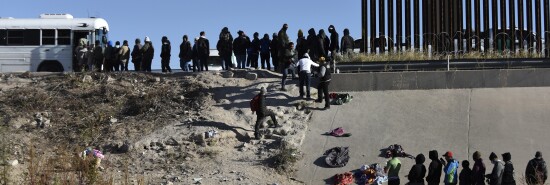
Immigrants are only coming because we let them in
Conn Carroll
Video Embed
The stories we tell about public policy are important because the narratives most people believe end up informing what solutions are acceptable.
Take immigration.
NOVEMBER BORDER NUMBERS SHOW THAT IF YOU LET THEM IN, MORE WILL COME
Is the current crisis caused by random, unfortunate events in other countries that are just now, all of a sudden, pushing unprecedented numbers of immigrants toward our southern border?
Or is the current border crisis caused by changes in United States immigration enforcement policy that make it easier for immigrants to enter our country, thus causing more to come?
If the border crisis is being caused by a sudden series of unfortunate events abroad, then the best solution is probably to open our doors and help as many people into our country as possible. Things must be suddenly terrible in their home country — why else would immigrants move here now?
But if the border crisis is being caused by a change in U.S. immigration enforcement, and immigrants are only coming now because they know it is easier to enter, then the solution is to tighten border enforcement, not throw our doors open to all who want in.
The supposed journalists at the Associated Press have chosen which narrative they want to believe. Under the headline, “Migrants flee more countries, regardless of US policies,” Elliot Spagat writes, “In 2014, groups of unaccompanied children escaping violence in Central America overwhelmed U.S. border authorities in South Texas.”
Except that is not what happened. Groups of unaccompanied children from Central America did not suddenly start showing up at the southern border in the summer of 2014. Instead, the numbers grew slowly from just 16,000 in 2011 to 38,000 in 2013.
That jump in just two years caught the notice of researchers at the University of Texas at El Paso, who then investigated the cause. What they found alarmed them. Before anyone ever took pictures of children in cages, these researchers predicted the 2014 border crisis before it happened. Over 68,000 unaccompanied children swarmed the border, as the researchers warned they would, in 2014.
So why were so many unaccompanied children crossing the border illegally? Was it rising crime in Honduras? Droughts in El Salvador? Hurricanes in Guatemala?
Nope. It was none of those things. The problem lay entirely with U.S. policy at the southern border. From the report:
Both Border Patrol and ICE ERO officers agreed that the lack of deterrence for crossing the U.S.-Mexican border has impacted the rate at which they apprehend UACs. Officers are certain that UACs are aware of the relative lack of consequences they will receive when apprehended at the U.S. border. UTEP was informed that smugglers of family members of UACs understood that once a UAC is apprehended for illegal entry into the United States, the individual will be reunited with a U.S.-based family member pending the disposition of the immigration hearing. This process appears to be exploited by illegal alien smugglers and family members in the United States who wish to reunite with separated children.
In other words, immigrants had learned that if they got caught by U.S. officials at the southern border, not only would they not be punished, but U.S. officials would actually help them complete their journey.
The AP never mentioned this little fact.
The reality is that Cuba, Venezuela, and Nicaragua have been terrible places to live for decades now. If misery at home were the cause of immigrants coming to the U.S., the current border crisis would have happened years ago.
The only reason it is happening now is that President Joe Biden has completely dismantled our immigration enforcement system. Immigrants from around the world know that if they come to the U.S., Biden will let them in and let them stay forever, even after they lose their asylum claim, as long as they don’t commit a violent felony.
The only way the people solve the current border crisis is by electing a president willing to enforce our existing immigration laws.
CLICK HERE TO READ MORE FROM THE WASHINGTON EXAMINER
